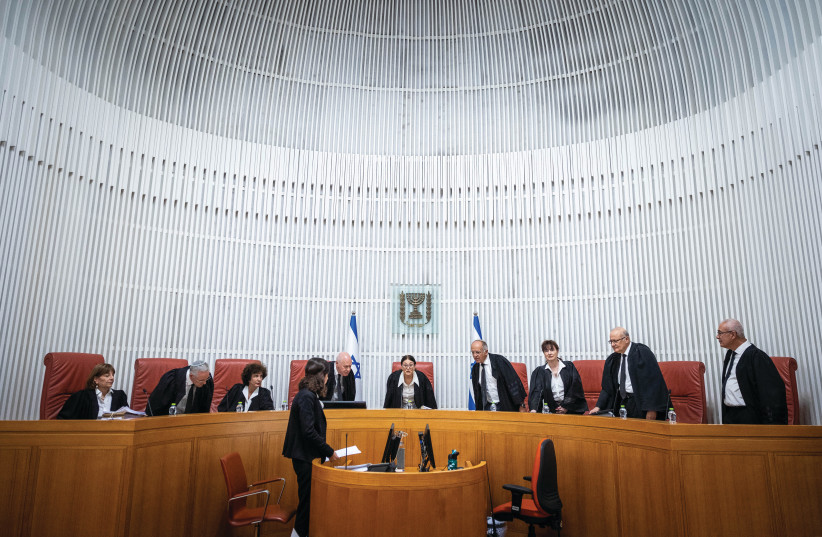In their decision announced on January 1, 2024, regarding the amendment to the Basic Law aimed at reducing the reasonableness standard, eight out of the 15 judges comprising the High Court ruled to invalidate the law, while the remaining 12 affirmed that the Supreme Court possesses the authority to intervene in Basic Laws.
The overwhelming majority supporting the court’s bold and potentially perilous intervention in the Basic Law underscores a shared perspective among the judges appointed to the Supreme Court.
This unity is evident even among so-called “conservative” judges, a fact that former minister Ayelet Shaked took pride in selecting, reminiscent of the uniformity seen in the communist Soviet Union. Above all, this situation highlights the challenge of achieving genuine diversity in the composition of the supreme judges through “deals” and compromises between the right and left factions within the judges’ selection committee. It suggests that a more fundamental change in the process of selecting judges is required.
High Court's ruling devalues Israeli legislature
The High Court’s ruling signifies the devaluation of the Israeli legislature, stripping it of its significance as both a constituent and legislative authority. Essentially, the democratic and autonomous choices made by citizens in the State of Israel, the election of their representatives to the legislature, and the decisions of these elected officials are rendered meaningless.
In its decision, the High Court essentially dissolves the Knesset, irrespective of the individuals occupying its seats. The Knesset’s fundamental power lies in its role as a constituent authority, a cornerstone established at the state’s inception to enable the enactment of a constitution. This constitution would articulate and embody the principles and values upheld by Israeli society, shaping the foundation upon which the nation aspires to live.

Despite the Knesset’s inability to formulate a constitution due to political and social conflicts, it devised basic laws intended to serve as temporary provisions – pending the establishment of a constitution – outlining fundamental principles for the state’s organization, interagency relationships, and the nature of the state. These basic laws were crafted with a superior status, intended to supersede ordinary legislation.
It is crucial to assert unequivocally that the Israeli court lacks a legitimate source of authority for engaging in judicial review of laws passed by the Knesset, let alone basic laws. In essence, the High Court has been operating outside the bounds of the law and without proper authority for decades, a situation exacerbated when it intervened for the first time in history in matters related to the Basic Law.
IN FRONT of the Knesset, the government of Israel, and the people of Israel (the majority of whom, as reflected by the legislative majority, oppose the constitutional revolution advocated by the supreme judges), a critical and pivotal decision now looms, poised to shape the country’s future. The initial choice is to capitulate to the dominion of the judiciary and disband the Knesset and the parliamentary elections in Israel, given that the High Court’s ruling implies the Knesset lacks legislative authority and is not a constituent body.
The alternative is to take a defensive stance, champion democracy, assert that the State of Israel rejects the unconstitutional verdict, and disavow any authority of the High Court of Justice. This approach would involve enacting an overriding clause and amending foundational judicial laws and legislation to preclude any potential for judicial legislation by the High Court.
It is understood that now the governmental, public, and media attention is on the war in Gaza, and it is likely that it will be directed to the security situation in the north after the war in Gaza. Therefore, the steps to amend the legislation will have to wait – but the elected officials in the conservative camp must publicly state that they are not ready to accept the situation in which they become marionettes in a puppet theater and that once the security situation is settled, the constitutional crisis will also be settled and Israeli democracy will be restored.
Most of all, the annulment of the reasonableness standard amendment testifies to the essential and vital need to carry out a legal reform in the State of Israel, which will restore the balance between the governing authorities and strengthen Israeli democracy. Those who were afraid to govern, to carry out necessary legal reform, and surrendered to the centers of power of the legal system, the academy, the media, and the economic elite; eventually got a legal coup on steroids.
The State of Israel is now at the most dangerous political junction in the country’s history (while we are at the most dangerous security junction). The citizens of Israel and the elected officials have to choose whether they fight for the democratic image of the country in the form of passing legal reform or whether they are willing to humbly accept the transformation of Israel into a dictatorship.
The writer is a researcher and Israeli publicist. He holds a PhD in political studies.
